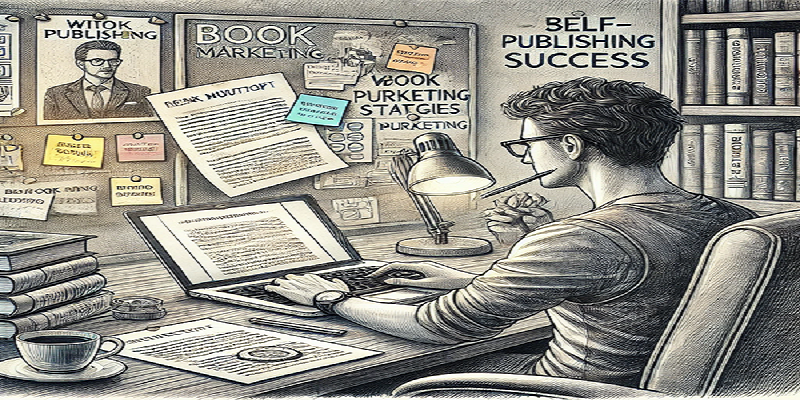The Rise of Self-Publishing
The world of publishing has changed dramatically. Gone are the days when authors had to rely on traditional publishing houses to get their books into readers’ hands. Today, self-publishing has opened doors for writers everywhere, offering a path to share their stories without waiting for industry gatekeepers.
📚 Why is self-publishing growing?
✔ More control over creative and business decisions.
✔ The rise of Amazon Kindle Direct Publishing (KDP), IngramSpark, and other platforms.
✔ Access to global audiences without the need for an agent or publisher.
Self-publishing is an exciting, empowering journey, but it comes with challenges. This guide will walk you through the benefits, process, marketing strategies, and common pitfalls helping you successfully launch your book into the world.
Benefits of Self-Publishing
Why do so many authors choose to self-publish instead of going the traditional route?
1️⃣ Full Creative Control
With self-publishing, you call the shots:
✔ Choose your cover design, book format, and title.
✔ Decide on pricing and distribution.
✔ Keep all rights to your book (no giving up royalties to publishers).
📌 Example: Many bestselling authors like Colleen Hoover and Andy Weir started as self-published writers before gaining mainstream success.
2️⃣ Higher Royalties & Profits
Traditional publishers typically pay authors 10-15% royalties per book. Self-published authors earn up to 70% (depending on the platform).
💰 Comparison:
✔ Traditional publishing: $2-$3 per $20 book sale.
✔ Self-publishing (Amazon KDP): $10-$14 per $20 book sale.
📌 Pro Tip: Price your book competitively lower prices often lead to higher sales volume.
3️⃣ Faster Publishing Timeline
With self-publishing, your book can be published within days, compared to months (or years) in traditional publishing.
✔ No waiting for an agent or publisher approval.
✔ Immediate access to platforms like Amazon KDP, Apple Books, and Barnes & Noble Press.
✔ The ability to update or revise your book whenever you want.
📌 Example: You can release a second edition of your book without dealing with publisher contracts.
Steps to Self-Publish Your Book
1️⃣ Manuscript Preparation
Before publishing, your manuscript should be polished and error-free.
✔ Self-edit for grammar, clarity, and structure.
✔ Hire a professional editor for proofreading.
✔ Beta readers help spot weak points before release.
📌 Pro Tip: Use tools like Grammarly, ProWritingAid, or Hemingway Editor for self-editing.
2️⃣ Cover Design: Your First Impression Matters
People judge books by their covers especially in online marketplaces.
✔ Invest in a professional book cover designer.
✔ Use high-contrast fonts for readability.
✔ Make sure the cover fits your genre expectations.
📌 Example: A fantasy novel might need illustrations, while a business book should look clean and professional.
3️⃣ Formatting for Print & Digital
📖 Print Book Formatting:
✔ Platforms like IngramSpark require specific print formatting.
✔ Use Adobe InDesign or Vellum for professional layouts.
📱 Ebook Formatting:
✔ Convert to EPUB and MOBI for Kindle, Nook, and Apple Books.
✔ Use tools like Kindle Create or Draft2Digital.
📌 Pro Tip: Always preview your book on Kindle or other devices to spot errors before publishing.
4️⃣ Choosing a Publishing Platform
There are many self-publishing platforms each with different advantages.
✔ Amazon KDP – Best for Kindle and print-on-demand books.
✔ IngramSpark – Ideal for wide distribution to bookstores & libraries.
✔ Draft2Digital – Distributes ebooks to multiple retailers.
✔ Apple Books & Google Play Books – Expands your audience beyond Amazon.
📌 Pro Tip: Amazon KDP dominates the ebook market (over 60% of sales), so starting there is a great strategy.
Marketing Your Book: Getting Readers to Notice
Writing a book is just the first step marketing is what gets it into readers’ hands.
1️⃣ Build an Author Platform
A strong online presence helps attract readers.
✔ Website & Blog – Showcase your books and share writing updates.
✔ Social Media – Engage on Twitter, Instagram, and Facebook.
✔ Email List – Build a mailing list with exclusive content and giveaways.
📌 Example: Bestselling indie authors like Joanna Penn use email marketing and blogs to grow their audience.
2️⃣ Leverage Amazon & Goodreads
✔ Optimize your Amazon book description with keywords.
✔ Encourage early reviews (ask beta readers to post honest reviews).
✔ Run a Goodreads Giveaway to attract readers.
📌 Pro Tip: More reviews = higher rankings on Amazon!
3️⃣ Paid & Free Promotions
✔ Amazon Ads & Facebook Ads – Paid advertising boosts visibility.
✔ BookBub Promotions – Discounted book deals bring thousands of readers.
✔ Social Media Giveaways – Offer free books to build engagement.
📌 Pro Tip: Running a $0.99 promo for a few days can spike Amazon rankings and get more reviews.
Common Challenges and How to Overcome Them
1️⃣ Lack of Initial Sales
🔹 Solution: Run a free ebook promotion, engage in Facebook groups, and use SEO-friendly book descriptions.
2️⃣ Struggles with Marketing
🔹 Solution: Focus on one platform at a time (Instagram, Twitter, or Facebook), and network with book bloggers.
3️⃣ Getting Reviews
🔹 Solution: Offer free review copies to early readers and join ARC (Advanced Reader Copy) programs.
📌 Pro Tip: Never pay for fake reviews Amazon removes them, and it can damage your reputation.
The Future of Self-Publishing is Bright
Self-publishing is more accessible than ever, allowing authors to control their work, earn higher royalties, and reach global audiences.
Key Takeaways:
✔ Polish your manuscript with editing and formatting.
✔ Invest in a professional cover first impressions matter.
✔ Choose the right self-publishing platform for your goals.
✔ Market your book consistently using social media and email lists.
✔ Keep learning the best indie authors constantly refine their strategies.
🚀 What’s Your Next Step?
✔ Have you published a book?
✔ Are you considering self-publishing?
Let’s discuss your biggest self-publishing challenge! 💬

